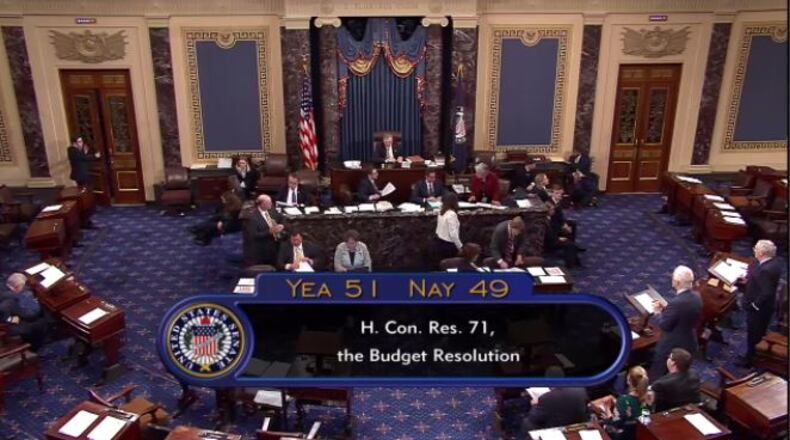The GOP push for a major tax reform bill in Congress took an important step forward on Thursday night, as the Senate approved a Republican budget outline for 2018, authorizing work on a tax reform bill that cannot be derailed by a filibuster, as President Donald Trump urged Congress to move quickly on a tax package.
"Tonight we completed the first step to replacing our broken tax code," said Senate Majority Leader Mitch McConnell.
"Our tax code hasn’t been updated in over 30 years – it’s complicated and outdated," said Sen. James Lankford (R-OK).
The Senate vote was 51-49, with only Sen. Rand Paul (R-KY) breaking ranks to vote against the plan, and was welcome news at the White House.
"I will tell you, our country needs tax cuts," the President said at the White House on Thursday afternoon, arguing tax relief would spur new economic growth in the United States on a large scale.
"If we get this done, it will be historic," the President said. "It will be bigger than any plan ever approved or - ever. It will be the biggest tax cuts in the history of our country."
That point was repeated on almost an endless loop by GOP Senators during Senate debate on the budget outline for 2018.
"Tax reform would help spur economic growth, which, combined with a disciplined spending approach by Congress, can help begin to bring down our national debt," said Sen. Johnny Isakson (R-GA).
"This is the first step to getting us to pro-growth tax reform," said Sen. John Cornyn (R-TX).
"It's been more than 30 years since we reformed the tax code," said Sen. Jeff Flake (R-AZ). "We have more preferences and loopholes and deductions than we know what to do with."
"If we don't get that done, then I don't think we have another opportunity to pass a tax bill in the next four years," said Sen. Roy Blunt (R-MO).
"This budget allows us to cut taxes," said Sen. Lindsey Graham (R-SC), as few Senators dwelled on the fact that the GOP plan would allow their party's tax plan to create $1.5 trillion in extra deficits over 10 years.
For some, that wasn't enough.
"We should cut everyone's taxes, to make sure we cut taxes for the middle class," said Sen. Rand Paul (R-KY), who offered an amendment to allow for a tax cut that could raise deficits by $2.5 trillion over ten years.
But that was too much for his GOP colleagues; Paul's change was soundly defeated on a vote of 93-7.
While Republicans rallied around the budget plan, critics of President Trump denounced it during Senate debate, in no uncertain terms.
"This is not a bad budget bill, this is a horrific budget bill," said Sen. Bernie Sanders (I-VT).
GOP Congressional leaders must still sort out the differences between the budget outlines approved in the House and Senate, before starting on their effort for the first major tax reform plan since 1986.
Some late changes made in the plan by Senate Republicans could pave the way for the House to simply accept the Senate version of the budget as early as next week, which would speed up the effort to begin debate on tax reform.
As of now, the fine print of the GOP tax reform package remain a secret. Republicans want that to change in the next few weeks.
About the Author
The Latest
Featured



